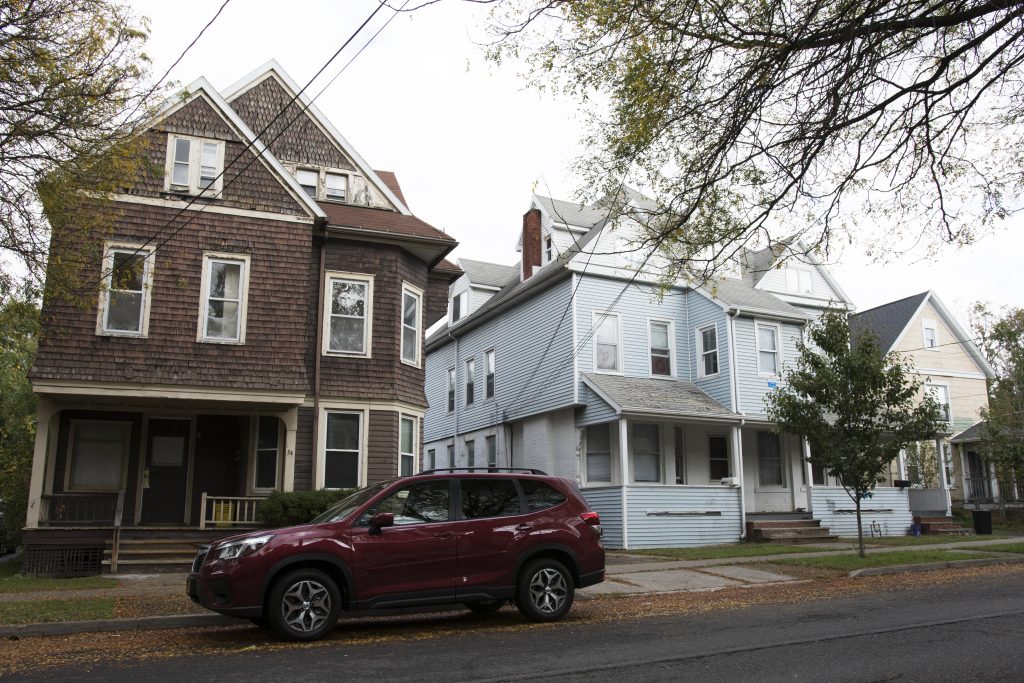Moving off campus at Binghamton University can be a rite of passage for students as they enter into the world of leases, rent and landlords for the first time. In an effort to ease stress that can be associated with the process, the Student Association (SA) is creating a new project to provide students with housing resources and knowledge about their rights as tenants.
In 2018, the Student Housing subcommittee of the Town-Gown Advisory Board proposed a student representative program to promote housing literacy, noting a need for the distribution of accurate housing information from the city of Binghamton’s Office of Building Construction & Code Enforcement. With this goal in mind, Matthew Johnson, assistant director of the SA, has been working alongside Khaleel James, vice president for multicultural affairs and a junior double-majoring in economics and human development, John Santare, vice president for academic affairs and a senior double-majoring in biology and comparative literature and BU Council Representative Franklin Richards, a second-year graduate student studying public administration, to bring the housing advisory project to life.
The project has a tentative start date of spring 2020, but is still in the developmental stage.
Santare was approached by Johnson to help construct the literature of the project because of his experience with writing policy literature for the SA. Santare said he believes the program would be mutually beneficial to both students and the city of Binghamton.
“Students would be more prepared for off-campus living, now equipped with additional tools and bits of information,” Santare wrote in an email. “As of right now, student use of Code Enforcement resources is a reaction to unfavorable conditions that they find themselves in. A goal of increasing the flow of information would be preventing future occurrences of these bad housing situations.”
According to Santare, the program will hire students as code ambassadors to be trained in specific topics pertaining to the housing process, such as how to address deficiencies that may compromise personal health or safety, how to promptly and effectively reach out to the Office of Building Construction & Code Enforcement and how to be a good neighbor.
After an initial training period, additional education will occur throughout the school year, all of which would be sponsored by the Municipal Code Department of the city of Binghamton with periodic support from other affiliated organizations, such as the New York State Department of Health.
James was brought onto the project to help combat issues that students of disadvantaged backgrounds may find themselves in during the housing process. James wrote in an email that the project is necessary and important to helping students transition into living off campus.
“Knowing that the off-campus housing in Binghamton has not gotten the greatest reviews from the student body, I figured this could be a way we as the SA could help,” James wrote. “Taking on something this big is not a walk in the park so with this in mind I wanted to ensure that this project went as smooth as possible.”
According to Santare, project leaders are working through a variety of decisions, such as the number of housing advisers that will be hired. In addition to helping circulate information, housing advisers would have insight about housing code and common violations and would be available to the student body through office hours. Ambassadors will receive a stipend for their time, although that amount has yet to be determined.
Carter Carrieri, a junior majoring in accounting, said a project like this is useful to many students moving off campus, noting he has dealt with unethical landlords in the past.
“I think that this project could be really helpful for students moving off campus,” Carrieri said. “In my own experience, landlords do things that are illegal and violate students’ rights, so this could be a good resource.”



